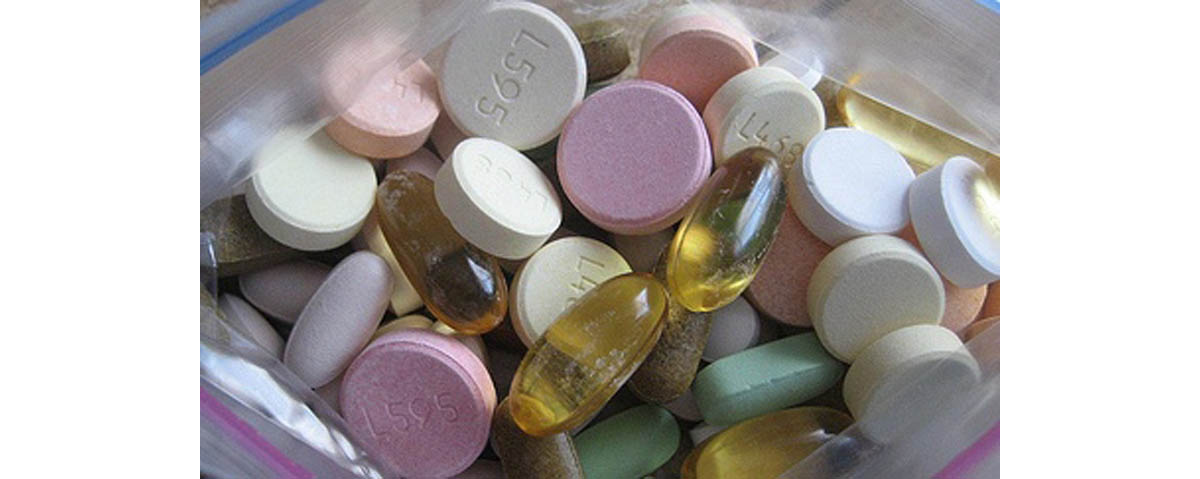Vitamins and minerals are very important to our body, and not getting enough could lead to some serious health problems. While a diverse diet can supply most, if not all of the needed vitamins and minerals for our body in sufficient quantities, eating a restrictive diet can lead to serious and potentially even fatal deficiencies.
Most of us know that vitamins and minerals are important for our health, but still struggle to get enough through our meals. Vegetarians, for instance, are prone to a vitamin D deficiency. Some of the most common deficiencies in anyone include iron, vitamin C, magnesium, and vitamin E. What can you do when you aren't getting enough vitamins and minerals? That's where dietary supplements come in, but are they good, and are there any risks?
What are vitamins and minerals?

Vitamins are small organic molecules that are produced by plants and/or animals and that our body needs on a daily basis to function properly, as our body cannot produce the vitamins by itself. Vitamins can belong either to the group of water-soluble vitamins, like e.g. vitamin C or to the group of fat soluble vitamins like e.g. vitamin A or D. Most of the vitamins we need come from fruits and vegetables.
Minerals are elements like potassium, sodium, calcium and iron, which the body also need. Plants absorb minerals from the soil and animals take them up by eating these plants. Therefore both meat and vegetables contains many minerals. Not ingesting enough vitamins and minerals can leads to serious deficiencies. Up until around 1900 the only source of vitamins and minerals was food and vitamin and mineral deficiencies were widespread. Nowadays, vitamin and mineral dietary supplements, mainly in the form of pills, are readily available everywhere.
What are the benefits of taking vitamin and mineral supplements?
Vitamin deficiencies
Different vitamin deficiencies can lead to different illnesses: Vitamin A deficiency can lead to night blindness and in severe cases to permanent blindness. It is still the most common reason for acquired blindness in certain areas of Southeast Asia, where the diet is low in red and yellow vegetables.
There are at least twelve different compounds that form the family of B vitamins. Deficiencies in B vitamins can cause such different illnesses as Beri-Beri (vitamin B1 or Thiamine), a disease that used to be common in areas where polished rice was a staple food, Pellagra (vitamin B3 or Niacin deficiency), dermatitis (Vitamin B7 or biotin deficiency) and birth defects (deficiency in vitamin B9 or folic acid). Vitamin C is a water soluble vitamin that is abundant in most fruits and vegetables. Deficiency of it causes scurvy which used to be the curse of sailors. Rickets is a deficiency in vitamin D which is as necessary to build strong bones as the mineral calcium.
Mineral deficiencies
Minerals like potassium calcium, magnesium and sodium are needed for nerve and muscle function, and calcium for strong bones. Sodium, which is necessary in small amounts, is usually contained in the diet in too high amounts which can lead to high blood pressure. Iron is needed in all cells to function properly and in the red blood cells to transport oxygen from the lungs to other parts of the body. Iron deficiency leads to iron deficiency anemia, the most common form of anemia. Other minerals needed in much smaller amount are copper, selenium, and cobalt.

Special circumstances that require more vitamins
While a diverse diet can supply most, if not all needed vitamins and minerals in sufficient quantities, eating a restrictive diet can lead to serious and potentially even fatal deficiencies. These can be prevented by taking dietary supplements.
Aside from prevention of these deficiency syndromes, having adequate levels of vitamins and minerals helps fighting off infections, and might even prevent certain health conditions like heart disease and cancer, though evidence for this is still somewhat controversial.
Certain situations or life styles require more vitamins than normal which might not be sufficiently covered even by a diverse diet. For example women who want to become pregnant are recommended to use a supplement of 400ug of Folic Acid (Vitamin B9) per day to have enough folic acid in their bodies at the time of conception to prevent birth defects such as e.g. spina bifida. Smokers have a higher need of vitamin C than non-smokers that can be filled by Vitamin C supplements.
What are the risks of taking vitamin and mineral supplements?
Vitamin overdose
There are certain vitamins, mainly water soluble ones, that do not cause any know toxicity when taken too much, like vitamin C and vitamin B12 (cobalamine), but in general, overdosing with certain vitamins can cause serious damage to the body which is the main risk in taking vitamin supplements that contain very high doses (several times the daily allowance) of vitamins. E.g. an overdose of preformed vitamin A can cause eye damage and in higher doses even fatalities due to damage to the cells in the entire body.

Retinol, which is one form of vitamin A, has been shown to cause birth defects at moderate doses, which is the reason why prenatal vitamin supplements usually do not contain retinol, but beta-carotene, another form of vitamin A, that does not cause birth defects. Women who are pregnant or want to become pregnant should therefore not take any supplements that contain retinol. Large doses of Thiamin (vitamin B1) can cause drowsiness and muscle relaxation.
An overdose with Niacin (vitamin B3) can cause rashes, irregular heart beat, and fatal liver damage. It can also cause birth defects. Vitamin B5 can cause diarrhea, and B6 can cause nerve damage. An overdose of vitamin D leads to too much calcium being in the blood stream which can damage muscles, bones, heart and kidneys. At slightly lower levels, too much vitamin D can cause kidney stones.
Multivitamin preparations usually contain vitamin levels below the dangerous limits, so it is unlikely to develop any toxicities, if they are taken at the recommended dose. However, some single vitamin supplements often contain large doses, and might be toxic when combined with certain foods that are rich in these vitamins (e.g. vitamin A and D are present in liver in large quantities). Some minerals like iron and copper are very toxic, when taken in too large quantities.
Caution with pre-existing conditions
Increased intake of certain vitamins by using supplements has also been shown to have negative effects in certain pre-existing health conditions e.g. vitamin E supplements worsened congestive heart failure in one large study. Vitamin K can decrease the effectiveness of certain blood thinning drugs (warfarin) that patients use to prevent stroke and heart attacks. Carotenoids (certain forms of vitamin A) have been shown to have negative effects in smokers.
Mineral poisonings
Iron poisoning due to the intake of brightly colored multivitamins by little children who mistook them for candy used to be one of the most common reasons for fatal poisonings in children until packaging requirements for child safety were changed for supplement containing iron.
- Photo courtesy of karen_d on Flickr: www.flickr.com/photos/karen_d/2325217088
- www.cdc.gov/ ods.od.nih.gov/Health_Information/Dietary_Reference_Intakes.aspx
- en.wikipedia.org/wiki/Dietary_supplement


Your thoughts on this